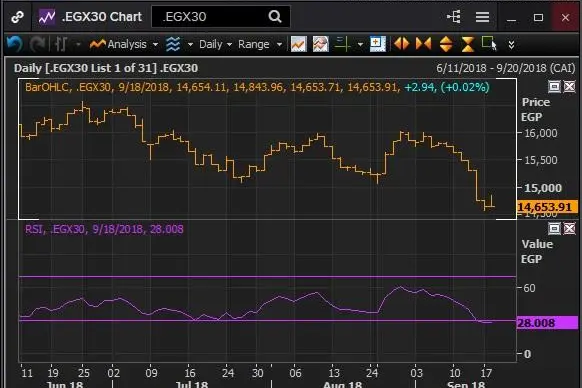PHOTO
Egypt’s stock market flattened out on Tuesday after two days of decline following a series of arrests relating to alleged market manipulation.
The Cairo criminal court on Saturday ordered the arrest of two sons of former president Hosni Mubarak on charges of stock market manipulation, state news agency MENA reported, stating that a trial date has been set for October 20.
The former president’s sons and seven other men are accused of violating stock market and central bank rules to make unlawful profits through dealing in shares of Al Watany Bank of Egypt, according to a Reuters report. The case against Mubarak’s sons was first brought in 2012, but they were subsequently released on bail and ordered not to leave the country.
News of the latest arrests sparked a selloff in Egyptian shares on Sunday. At the start of the week, the market touched its lowest level so far this year before subsequently recovering.
Qalaa Holdings dropped 6 percent on Sunday after the company said that its head of investor relations, Amr El Kadi, was detained in connection to the case.
EFG Hermes was the other stock that was hit hard, dropping 8.6 percent, after the company announced that its non-executive vice-chairman Yasser El Mallawany had been detained in connection with the case.
The stock market index ended the session 3.4 percent lower on Sunday and then fell again by 0.7 percent on Monday.
However, the index regained some ground on Tuesday. The index added more than 1 percent during the day but only managed to close 0.02 percent higher at the end of the session.
Qalaa Holdings dropped 0.65 percent for the day, while EFG Hermes dropped 1.06 percent after regaining 3.3 percent on Monday.
When asked about today’s recovery, Allen Sandeep, research director at Naeem Brokerage told Zawya via email: “We view this as a tentative recovery post the recent selloff; especially, led by stocks that have strong fundamentals but were oversold.
“Plus, if you look at valuations, the EGX 30 trades at a sizable discount; a 2018 P/E of less than 10x seems unfair for an economy which is expected to grow by close to 6 percent,” Sandeep added.
Egypt’s main index (EGX30) appears to be oversold, according to the Relative Strength Index (RSI 14). The index is a measurement between zero and 100. Traditionally, the RSI is considered overbought when above 70 and oversold when below 30.
Data from Thomson Reuters’ Eikon shows that EGX30 has an RSI of 28.008. Egypt’s stock market index has dropped 2.43 percent so far since the start of the year.
Analysts said that many events have affected negatively the market, and the arrests are not the only factor to blame for this week’s declines.
Weak emerging markets (EM) have weighed on sentiment in Egypt, with the MSCI Emerging Markets index down 11.73 percent so far since the start of the year.
“A series of events has affected negatively the Egyptian Market in the last couple of days,” Samar Soliman of Okaz Stockbrokers & Investment Consultants told Zawya.
“The selloff in EM is one of the major factors. Concerns over interest rate hikes in EM, with Turkey raising its interest rates by 5 percent and whether Egypt will be forced to raise rates following the hike in Turkey is another factor,” he added in an emailed response. “Concerns over potential weakness in the Egyptian pound (EGP) has also hit investor sentiment.”
Global Telecom Holding (GTHE) had announced to the exchange on Sunday that “the agreement for the sale of the tower business of its subsidiary in Pakistan, Jazz, to Tanzanite Tower Limited (Tanzanite) has been terminated”.
The company’s shares have dropped 6.58 percent so far this week.
“The arrests related to the stock market manipulation case and shattering hopes of Global Telecom Holding’s rebound after cancelling the Pakistan deal have played a negative part as well,” Soliman said.
Elsewhere in the region, Dubai’s index was last down 0.33 percent on Tuesday, Abu Dhabi’s index edged 0.13 percent lower, Saudi Arabia’s index gained 0.44 percent, Kuwait’s index retreated 0.06 percent, while Bahrain’s index ended 0.08 percent higher and Oman’s index dropped 0.45 percent.
(Reporting by Gerard Aoun; Editing by Michael Fahy)
(gerard.aoun@thomsonreuters.com)
Our Standards: The Thomson Reuters Trust Principles
Disclaimer: This article is provided for informational purposes only. The content does not provide tax, legal or investment advice or opinion regarding the suitability, value or profitability of any particular security, portfolio or investment strategy. Read our full disclaimer policy here.
© ZAWYA 2018





















